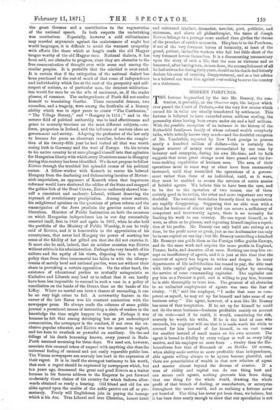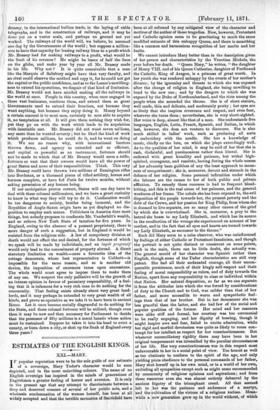MODERN FORTUNES.
THE fortune bequeathed by the late Mr. Brassey, the con- tractor, is probably, as the Observer says, the largest which ever passed the Court of Probate,—for the very few estates which exceed his in value are usually transferred by settlement. This fortune is believed to have exceeded seven millions sterling, the personalty alone having been sworn under six and a half millions. With the possible exception of an instance in the history of the Rothschild family—a family of whose colossal wealth everybody talks, while nobody knows very much—and the doubtful exception of Mr. Vanderbilt, reported by New York gossips to possess nearly a hundred million of dollars—this is certainly the largest amount of money ever accumulated by one man by industry and enterprise, during his own life-time, and its bulk suggests that some great change must have passed over the for- tune-making capabilities of business men. The area of their operations must in some way or other have been enormously increased, until they resembled the operations of a govern- ment rather than those of an individual, until, as it were, they must be enabled to secure the services of entire armies of faithful agents. We believe this to have been the case, and to be due to the operation of two causes, one of them entirely good in its action, the other and more important one very doubtful. The national boundaries formerly fixed to speculation are rapidly disappearing. Supposing that an able man with a talent for business of almost any kind can secure a sufficiency of competent and trustworthy agents, there is no necessity for limiting his work to one country. He can repeat himself, as it were, as often as he pleases, and repeating himself implies a repeti- tion of his profits. Mr. Brassey can only build one railway at a time, be the profit never so great, just as one Ambassador can only be in one capital on one day ; but Mr. Brassey controlling a hundred Mr. Brasseys can guide them as the Foreign Office guides Envoys, and do the same work and acquire the same profits in England, France, India, and America all at once. Nothing can stop him ex- cept an insufficiency of agents, and it is just at this time that the reservoir of agency has begun to widen and deepen. In many departments of life individualism has ceased to pay, the able man with little capital getting more and rising higher by entering the service of some commanding capitalist. The capitalist can pay him as a Premier is paid, and is willing to pay him, because he is able thoroughly to trust him. The greatest of all obstacles to an unlimited employment of agents was once the fear of rivalry. "If," said the employer, " I make that man as com- petent as myself, he may set up for himself and take some of my business away." The agent, however, of a man like Mr. Brassey has none of that temptation. If he set up for himself he could not do the same business—business profitable mainly on account of its scale—and if he could, it would, considering the risk, scarcely be worth his while. If he is the kind of man who succeeds, his employer will see that it is made worth his while to succeed for him instead of for himself, to use vast means for another instead of small means on his own account. The agent is bound to fidelity by every vulgap as well as every lofty motive, and his employer no more feaw rivalry than the Ho- henzollerns fear that of Bismarck oK on Moltke. Of course,. when ability seeks service as more profitable than independence, able agents willing always to be agents become plentiful, and there are potentialities of wealth in that new relation of agent and master almost beyond the dreams of avarice. If a man of ability and capital can do one thing best and can secure such agents, nothing prevents him from doing that one thing for the whole world, drawing the whole profit of that branch of dealing, or manufacture, or enterprise throughout the entire world, and so realizing a fortune never yet heard of. The thing has never yet been done, we believe, but it has been done nearly enough to show that our speculation is not
dreamy, in the international bullion trade, in the laying of cable telegraphs, and in the construction of railways, and it may be
done yet on a vaster scale, and perhaps on ground not yet worked. The railways of the world will, we believe, be assumed one day by the Governments of the world ; but suppose a million- aire to have that capacity for leasing railway lines to a profit which Mr. Brassey had for making railways to a profit, what would be the limit of his revenue ? He might be lessee of half the lines on the globe, and make year by year all Mr. Brassey made in his life. Why not ? It is quite conceivable that a man like the Marquis of Salisbury might have that very faculty, and no rival could observe the method and copy it, for he could not get the capital or the public confidence, and as to the Lessee's unwilling- ness to extend his operations, we despair of that kind of limitation. Mr. Brassey would not have minded making all the railways in the world at once. People in this country, when once engaged in these vast businesses, continue them, and extend them as great Governments used to extend their frontiers, not because they want anything, but because they enjoy doing it. Money beyond a certain amount is to most men, certainly to men able to acquire it, no temptation at all. It will give them nothing they wish for, yet they go on with the work which leads to its acquisition with insatiable zest. Mr. Brassey did not want seven millions, any more than he wanted seventy ; but he liked the kind of work which produces millions, he could do it, and he went on doing
it. We see no reason why, with international barriers thrown down, and agency so extended and so efficient, and capital so powerful as an instrument, fortunes should not be made to which that of Mr. Brassey would seem a trifle, fortunes so vast that their owners would have all the power of great States and none of their responsibilities. Think. This very Mr. Brassey could have thrown two millions of Remington rifles into Bordeaux, or a thousand pieces of rifled artillery, horses and harness complete, or have fed Paris for twelve months, without asking permission of any human being.
If our anticipation proves correct, States will one day have to deal with these colossal millionaires, and we have a great curiosity to know in what way they will try to do it. Confiscation would be too dangerous to society, besides being immoral, and the Republics of Anglo-Saxon origin have as yet displayed no dis- position to employ such means. Politicians in America dare most things, but nobody proposes to confiscate Mr. Vanderbilt's wealth, and so relieve New York State of taxation for five years. In England, owing to the absence of a peasant proprietary, there is more danger of such a suggestion, but in England it would be resisted from the religious side. A law of compulsory division at death would not effect the end desired, for the fortunes of which we speak will be made by individuals, and an inipo't progressif would only lead to the concealment of property abroad. A direct statutory limitation on wealth—once a favourite idea of the cottage democrats, whose best representative is Cobbett—is impossible for the same reason, and so is another old device, the imposition of enormous taxes upon successions. The whole world must agree to impose them to make them of any use. We suspect the only palliative will be the growth of an intense opinion in favour of pecuniary responsibility, of a feel- ing that it is infamous for a very rich man to do nothing for the community. That feeling exists already about very great land- lords, and it may perhaps be extended to very great wealth of all kinds, and prove as operative as we take it to have been in ancient Rome. Let it once become socially disgraceful to do nothing for the State, and these colossal fortunes will be utilized, though even then it may be now and then necessary for Parliament to decide that the possessor of fifty millions is a moral lunatic whose action must be restrained. Suppose he takes it into his head to evict a county, or burn down a city, or shut up the Bank of England every three years ?































 Previous page
Previous page